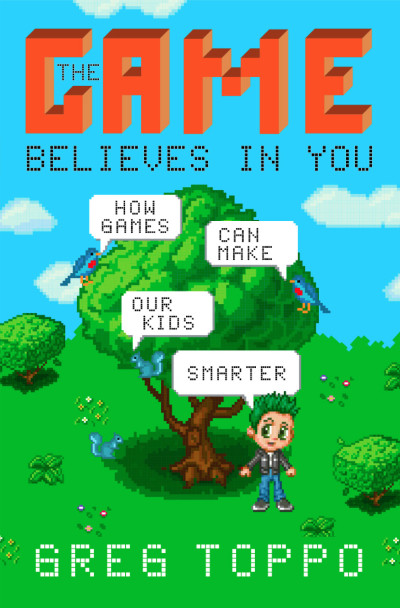From The Game Believes in You by Greg Toppo. Copyright (c) 2015 by the authors and reprinted by permission of Palgrave Macmillan, a division of St. Martin’s Press, LLC.
North Lakes Academy inhabits one of those big, brutalist, vertical concrete-block buildings that, from the outside, could be just about anything: an office building, a tire warehouse, a forlorn selfstorage facility. The tiny windows give away nothing. North Lakes sits on a lonely back road in Forest Lake, one of those far-flung Minneapolis suburbs that boasts plenty of retail—it’s sandwiched between a Target and a WalMart—but sits so impossibly far from the city, and so close to open wilderness, that calling it a suburb seems an overreach. It pulls students from nearly twenty-five surrounding towns. In the fall of 2008, Eric Nelson found himself teaching there.
He was miserable. A Minnesota native who grew up in a family of teachers—he jokes, “I couldn’t escape it”—Nelson majored in history at the University of Wisconsin and returned to Minnesota to earn his master’s degree in education. While he earned his degree, he was student-teaching, and like virtually every new teacher who ever lived, he’d begun his career with a hazy Sound of Music idea that everyone surely loved learning as much as he did, and that his students would hang on to his every word. “I was kind of shocked, when I started teaching, at how zombified ninth graders were,” he said. “They just sort of looked through me.” But he knew that among his students were several dedicated gamers, and they had learned how to work hard and overcome obstacles in the games they loved. Kids love video games, he said, “because they can just hit the reset button. That’s how a lot of life should work— you make new mistakes instead of repeating the same ones over and over again.”
At the time, Nelson was trying to figure out how to engage his students in world affairs, foreign policy, and the role of the United States in the world. The students had come of age in the wake of the September 11, 2001, terrorist attacks, which shocked most Americans’ geopolitical sensibilities awake. Yet to these heartland kids, the rest of the world still seemed remote.
Late one night in 2009, in the throes of a self-described “existential crisis” as he struggled to prepare for a morning class, Nelson took a break from fretting long enough to check his fantasy football team. He had been playing since 2004—his teams were back-to-back Super Bowl champions in 2005 and 2006—so he knew the game intimately. Both years he’d picked up a running back who had started the season slowly but “got hot” by the end and lifted his team to the playoffs. In just a few years, Nelson had begun to understand the NFL from the inside out, how a team worked and how the pieces fit together. “I was watching games differently,” he said. As he researched whether to start Jay Cutler or Drew Brees at quarterback the following Sunday, Nelson’s mood improved and his mindset shifted. Simply by thinking like a gamer, he realized, he was making a dull task into something enjoyable.
Digital technology made the task easy: rather than sifting through a week’s worth of newspaper clippings for the players’ standings and statistics, he could simply look online. At a glance, he saw where each player stood. Then it came to him: what if he wasn’t swapping Cutler and Brees, but China and Brazil? Just as fantasy football team owners draft, cut, and trade players based on their performance, his students could do the same with countries.
He’d replace passing yards and points per game with political crises and popular uprisings. Since he was struggling to get students interested in international developments, each country’s ability to fight its way into the news of the day would make it more valuable. Students could draft teams of countries—it didn’t matter if they were related—and compete for the newsiest cluster. Lackluster countries would quickly sink to the bottom and get traded, but if an earthquake or military coup struck, say, Indonesia, the student who was following the news most closely could snatch it up before anyone else found out. Nelson dubbed the game Fantasy Geopolitics.
Forget for a moment that his game was an adaptation of an abstraction. He brought it to a ninth-grade civics class in September 2009, and students immediately clung to countries with funny-sounding names. Djibouti was in great demand, but as soon as kids found it didn’t make news, they traded it. On the other hand, Mali may have seemed like just another unremarkable West African country at first, but when revolution came, the student who was paying attention picked it up unnoticed and pulled ahead. Soon everyone was paying attention. In December 2010, students began to notice that the kids who held Tunisia, then Libya, Egypt, and Yemen all began scoring points. The Arab Spring had arrived, and suddenly it meant something.
“It’s kind of like a way to nerd out without having to do it outside of school,” said Alissa Gmyrek, a senior who first played the game as a freshman. “You definitely have to research a lot.” During the World Cup last year, she picked Brazil and Argentina. “Latin America was really booming at that time,” she said. She noticed that political protests were roiling Venezuela, so she picked it too.
As the game caught on, Nelson began automating it, moving from a simple Google spreadsheet to a full-blown news tracker keyed to mentions in the New York Times. He created a “hall of fame” for the highest-scoring players, and soon realized that it was populated almost entirely by girls. “They do quiet research, they pick up the countries quietly,” he said. “They just kind of quietly paid attention, made those changes and crushed their competition.” At the end of the semester, the winner got a T-shirt that read, “Kickin’ Djibouti,” and everyone got the joke, said Gmyrek. Ask most high school seniors to stick a pin in Djibouti on a map of the world and they’d be lost. Gmyrek not only knows where the tiny North African country is—in the Gulf of Aden, opposite Yemen— but that it is “kind of a strategic place for the U.S. to have a base in.” Still, she said, “it never scores a lot of points, I guess. It’s just a tiny, tiny country.”

What happened outside of class was more surprising. Without Nelson’s urging or even his knowledge, students created a Facebook page that synthesized the international news they were following. They created a daily “White House brief,” a concise summary of what was happening worldwide. And they invited him to join a discussion group. “They were having these conversations on social media that I wanted to have in my classroom.” Even kids who lost interest after the game ended still benefited. As part of the game, Nelson encouraged students to add international newsfeeds to their personal Facebook pages. When the season ended, they went back to their old habits of reading about “Miley Cyrus and all the other crap,” Nelson said, but their pages were shot through with news from around the world. “This sort of made my students the teachers,” he said. “Once we kicked off the game and they got into it, they were sort of coming into my classroom saying, ‘Hey Nelson, have you heard about what’s happening in Syria?’ and telling their classmates about these things too. It became a different kind of experience, and I became a little obsolete by choice, which I loved.”
Greg Toppo is USA Today’s national education and demographics writer. He is the author of The Game Believes in You: How Digital Play Can Make Our Kids Smarter. You can follow him at @gtoppo.


















